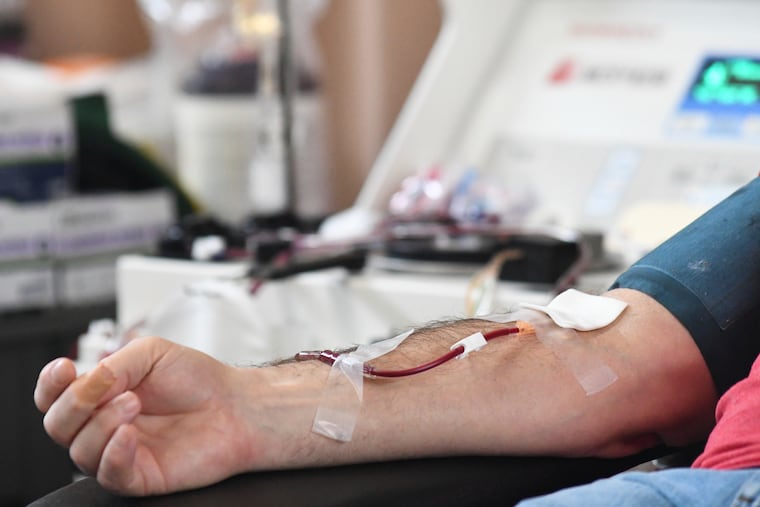More gay and bisexual men can soon donate blood, after they were banned for decades
Blood donation centers will use updated questionnaires to assess HIV risk and if someone is eligible to donate.

More gay and bisexual individuals will be able to donate blood in Philadelphia beginning Aug. 7, when the Red Cross — the nation’s largest supplier of blood — implements new rules for donor eligibility that focus on behavior rather than sexual orientation.
The Food and Drug Administration in May eased restrictions intended to protect against HIV that prevented men who have sex with men from donating blood unless they abstained from sex for three months. Under the new guidelines, blood donation centers should screen all donors, regardless of their sex, with a questionnaire that evaluates their risk for HIV.
Blood banks are widely expected to adopt the new guidelines as a way to expand the pool of potential donors and avoid blood shortages. But the FDA’s recommendation is not mandatory, and some centers may take longer to adopt the new questionnaire.
The Blood Donor Center at Jefferson Health will also begin using the updated questionnaire on Aug. 7. Donors can expect to see new questions that may seem more personal than they’re used to, such as whether they’ve had a new sexual partner or engaged in anal sex in the last three months, said Julie Karp, director of transfusion medicine at Jefferson. Everyone will complete the same questionnaire.
“I’m really excited about the changes that are coming because I think it speaks towards the equity that we’re hoping for,” Karp said. “I think it speaks towards progress.”
» READ MORE: One doctor on why he wants to donate blood
Anyone who has had new or multiple sexual partners, or had anal sex in the past three months will still have to wait to donate, according to the FDA.
Those who are taking PrEP, a drug that prevents HIV infection, also remain ineligible to donate because the drug can sometimes delay detection of the virus.
» READ MORE: New FDA guidelines rely on donor behavior and not sexual orientation
Expanding the pool of donors helps prevent blood shortages at hospitals, said Jennifer Aldrich, a professor of clinical medicine at the Lewis Katz School of Medicine.
“That is absolutely true in Philadelphia, as well, where we have an epidemic of gun violence and a lot of trauma,” she said.
In the past two months, the Red Cross has received 50,000 fewer donations than needed, said Alana Mauger, a spokesperson for the American Red Cross of Southeastern Pennsylvania. The supply at Jefferson — largely sourced from agencies like the Red Cross — has been stable, but there is always a need for blood, Karp said.
Blood donations often drop in the summer, but demand can increase at the same time because people are outdoors and more likely to get injured in accidents.
» READ MORE: Delco high school students braved needles and squeamishness to give back to their community
More progress is needed, activists and experts say
The new FDA guidelines eliminate universal restrictions for donors based on sexual orientation, but many say they do not go far enough to expand eligibility when there are alternatives.
Mazzoni Center, a health organization that serves Philadelphia’s LGBTQ community, had long advocated for changes to the policy.
“We encourage the FDA to continue forward so that its guidelines are entirely based on current scientific evidence and medical knowledge, rather than stereotypes and assumptions rooted in homophobia or Puritanism,” the center said in a statement the day after the changes were announced in May.
» READ MORE: Mazzoni Center selects infectious disease physician as new executive medical officer
Anybody who is sexually active could potentially transmit HIV through blood donation, but only men who have sex with men have been subjected to more rigorous screening, Aldrich said.
“There is inherent homophobia in our country. It’s hard not to imagine that playing some part,” she said.
Where can people donate?
The Jefferson Health and Philadelphia Red Cross blood donation centers will begin accepting an expanded pool of donors Aug. 7. This date may not apply to other donation centers, so call ahead to check.
People who are not eligible to donate blood but want to help can volunteer at blood drives and organize them, Aldrich said.
» READ MORE: Who else is eligible and where can I donate?
Here is a list of some of the blood drives happening in Philadelphia on or after Aug. 7:
Curtis Institute of Music: Aug. 7, 1-6 p.m. at 1726 Locust St. (Website)
Roxborough Memorial Hospital: Aug. 7, 9 a.m.-7 p.m. at 5800 Ridge Ave. (Website)
Mi Salud Wellness Center: Aug. 8, 2-7 p.m. at 200 East Wyoming Ave. (Website)
Philadelphia Blood Donation Center: Aug. 8, 11:45 a.m.-8 p.m. at 700 Spring Garden St. (Website)
Northeast Philadelphia Blood Donation Center: Aug. 9, 11:45 a.m.-8 p.m. at 1401 Rhawn St. (Website)
Camden County Blood Donation Center: Aug. 9, 11:45 a.m.-8 p.m. at 5425 Marlton Pike (Website)
Temple University Student Faculty Center: Aug. 10, 1-6 p.m. at 3340 N Broad St. (Website)
Courtyard by Marriott Philadelphia South at The Navy Yard: Aug. 11, 12-5 p.m. at 1001 Intrepid Ave. (Website)
Visit redcrossblood.org/give.html/find-drive for more times and locations.